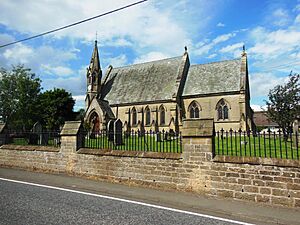St John the Evangelist's Church, Otterburn facts for kids
Quick facts for kids St John the Evanglist’s Church, Otterburn |
|
|---|---|

St John the Evanglist’s Church, Otterburn
|
|
| 55°13′56.41″N 2°10′53.67″W / 55.2323361°N 2.1815750°W | |
| Location | Otterburn, Northumberland |
| Country | England |
| Denomination | Church of England |
| History | |
| Dedication | St John the Evangelist |
| Dedicated | 27 October 1857 |
| Architecture | |
| Heritage designation | Grade II listed |
| Architect(s) | John Dobson |
| Groundbreaking | 28 September 1855 |
| Administration | |
| Parish | North Tyne and Redesdale Team |
| Deanery | Bellingham |
| Archdeaconry | Lindisfarne |
| Diocese | Diocese of Newcastle |
St John the Evangelist's Church is a beautiful church located in Otterburn, Northumberland, in the northeast of England. You can find it just off the A696 road. This church is a special place for the local community.
Contents
History of St John's Church
Building the Church
The first stone for Otterburn Church was placed on September 28, 1855. It was a big step towards building this important local landmark. The church was officially opened and dedicated on October 27, 1857. The Lord Bishop of Durham, Rt. Revd. Edward Maltby, led the dedication ceremony.
Who Built It?
Three sisters, the Misses Davidson from Lemmington Hall, and Mrs. Askew from Pallinsburn, paid for the church to be built. They wanted to create a place of worship for the people living on their land and in the surrounding area. They also provided £100 each year to help run the church. The famous architect John Dobson designed the building.
Church Organ
Inside the church, there was a special musical instrument called a pipe organ. This organ was built in 1910 by Nicholson and Newbegin. It had two keyboards, which are called "manuals" for organs. Organs like this make music using air flowing through many pipes.
Special Recognition
St John the Evangelist's Church is recognized as a Grade II listed building. This means it is an important historical building that needs to be protected. It has special architectural or historical interest.
See also

